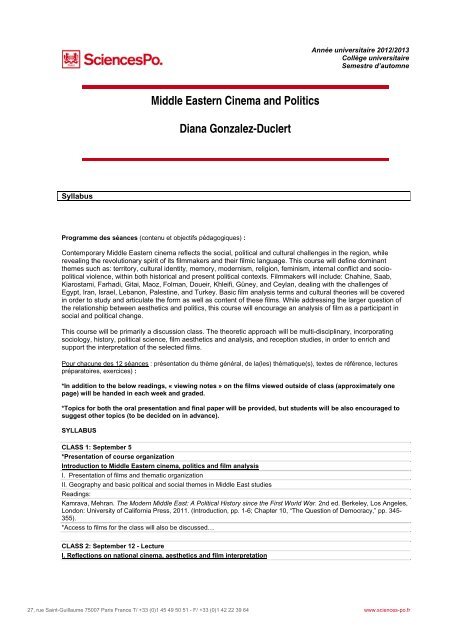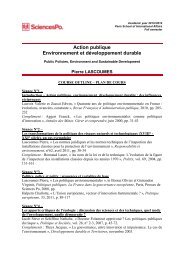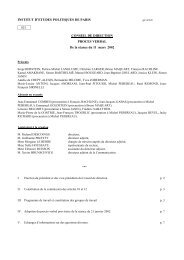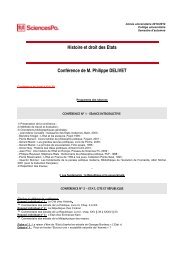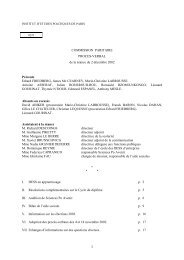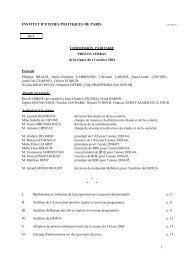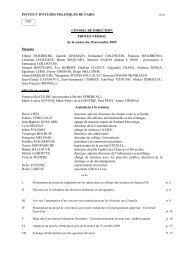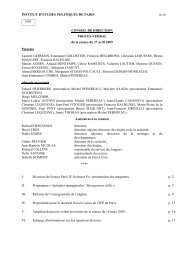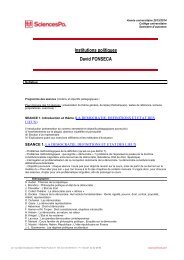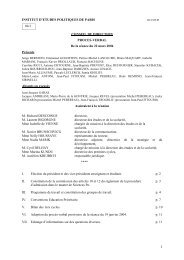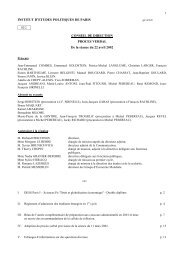Middle Eastern Cinema and Politics Diana Gonzalez ... - Sciences Po
Middle Eastern Cinema and Politics Diana Gonzalez ... - Sciences Po
Middle Eastern Cinema and Politics Diana Gonzalez ... - Sciences Po
Create successful ePaper yourself
Turn your PDF publications into a flip-book with our unique Google optimized e-Paper software.
Syllabus<br />
<strong>Middle</strong> <strong>Eastern</strong> <strong>Cinema</strong> <strong>and</strong> <strong><strong>Po</strong>litics</strong><br />
<strong>Diana</strong> <strong>Gonzalez</strong>-Duclert<br />
Programme des séances (contenu et objectifs pédagogiques) :<br />
Année universitaire 2012/2013<br />
Collège universitaire<br />
Semestre d’automne<br />
Contemporary <strong>Middle</strong> <strong>Eastern</strong> cinema reflects the social, political <strong>and</strong> cultural challenges in the region, while<br />
revealing the revolutionary spirit of its filmmakers <strong>and</strong> their filmic language. This course will define dominant<br />
themes such as: territory, cultural identity, memory, modernism, religion, feminism, internal conflict <strong>and</strong> sociopolitical<br />
violence, within both historical <strong>and</strong> present political contexts. Filmmakers will include: Chahine, Saab,<br />
Kiarostami, Farhadi, Gitai, Maoz, Folman, Doueir, Khleifi, Güney, <strong>and</strong> Ceylan, dealing with the challenges of<br />
Egypt, Iran, Israel, Lebanon, Palestine, <strong>and</strong> Turkey. Basic film analysis terms <strong>and</strong> cultural theories will be covered<br />
in order to study <strong>and</strong> articulate the form as well as content of these films. While addressing the larger question of<br />
the relationship between aesthetics <strong>and</strong> politics, this course will encourage an analysis of film as a participant in<br />
social <strong>and</strong> political change.<br />
This course will be primarily a discussion class. The theoretic approach will be multi-disciplinary, incorporating<br />
sociology, history, political science, film aesthetics <strong>and</strong> analysis, <strong>and</strong> reception studies, in order to enrich <strong>and</strong><br />
support the interpretation of the selected films.<br />
<strong>Po</strong>ur chacune des 12 séances : présentation du thème général, de la(les) thématique(s), textes de référence, lectures<br />
préparatoires, exercices) :<br />
*In addition to the below readings, « viewing notes » on the films viewed outside of class (approximately one<br />
page) will be h<strong>and</strong>ed in each week <strong>and</strong> graded.<br />
*Topics for both the oral presentation <strong>and</strong> final paper will be provided, but students will be also encouraged to<br />
suggest other topics (to be decided on in advance).<br />
SYLLABUS<br />
CLASS 1: September 5<br />
*Presentation of course organization<br />
Introduction to <strong>Middle</strong> <strong>Eastern</strong> cinema, politics <strong>and</strong> film analysis<br />
I. Presentation of films <strong>and</strong> thematic organization<br />
II. Geography <strong>and</strong> basic political <strong>and</strong> social themes in <strong>Middle</strong> East studies<br />
Readings:<br />
Kamrava, Mehran. The Modern <strong>Middle</strong> East: A <strong>Po</strong>litical History since the First World War. 2nd ed. Berkeley, Los Angeles,<br />
London: University of California Press, 2011. (Introduction, pp. 1-6; Chapter 10, “The Question of Democracy,” pp. 345-<br />
355).<br />
*Access to films for the class will also be discussed…<br />
CLASS 2: September 12 - Lecture<br />
I. Reflections on national cinema, aesthetics <strong>and</strong> film interpretation<br />
27, rue Saint-Guillaume 75007 Paris France T/ +33 (0)1 45 49 50 51 - F/ +33 (0)1 42 22 39 64 www.sciences-po.fr
II. Basic principles of film analysis: Mise-en scène, narrative, framing, lighting, camera movement <strong>and</strong> editing<br />
(with film excerpts)<br />
Readings:<br />
SHAFIK Viola. Arab <strong>Cinema</strong>: History <strong>and</strong> Cultural Identity, Cairo, The American University in Cairo Press, 2000 (not<br />
required reading, but pages will be provided for better underst<strong>and</strong>ing of the lecture)<br />
Morris, Pam, ed. The Bakhtin Reader. London: Edward Arnold, 1994, (pg. 5-17, <strong>and</strong> pg. 20-23).<br />
Bordwell, David <strong>and</strong> Kristen Thompson. Film Art: an Introduction, 5 th edition. New York: McGraw Hill Co., Inc., 1997 (pp.<br />
169-183, 226-227, 236-263)<br />
*To guide you, I will provide a glossary of film terms online to concentrate on for the Bordwell <strong>and</strong> Thompson reading, as<br />
well as reading notes for the Morris text on Bakhtin.<br />
CLASS 3: September 19<br />
<strong>Po</strong>wer, Religion <strong>and</strong> Oppression 1: Fundamentalism <strong>and</strong> intellectual freedom<br />
Destiny (El-Maseer) (Youssif Chahine, Egypt, 1997)<br />
Readings:<br />
Chahine, Youssef, Joseph Massad. “Art <strong>and</strong> <strong><strong>Po</strong>litics</strong> in the <strong>Cinema</strong> of Youssef Chahine,” in Journal of Palestine Studes,<br />
Vol. 28, No. 2, Winter 1999, pp. 77-93. Stable URL: http://www.jstor.org/stable/2537936<br />
Berman, Sheri. “Islamism, Revolution, <strong>and</strong> Civil Society” in Perspectives on <strong><strong>Po</strong>litics</strong>, Vol. 1, No. 2 (Jun., 2003), pp.<br />
257-272 . Published by: American <strong>Po</strong>litical Science Association. Article Stable URL: https://acces-distant.sciencespo.fr:443/http/www.jstor.org/stable/3688899<br />
*Short quiz on film vocabulary (from Bordwell <strong>and</strong> Thompson’s text <strong>and</strong> glossary)<br />
CLASS 4: September 26<br />
<strong>Po</strong>wer, Religion <strong>and</strong> Oppression 2: Women, sexuality <strong>and</strong> oppression<br />
Dunia: Kiss Me not on the Eyes (Jocelyne Saab, Egypt/Lebanon, 2006)<br />
Kadosh (Amos Gitai, Israel, 1999)<br />
(No readings this week)<br />
CLASS 5: October 3<br />
Question of Territory, internal conflict <strong>and</strong> war: Lebanon<br />
West Beirut (Ziad Doueiri , Lebanon, 1998)<br />
Readings:<br />
Denney, Julie <strong>and</strong> Martha Wenger, “Lebanon's Fifteen-Year War 1975-1990” in <strong>Middle</strong> East Report, No. 162, Lebanon's<br />
War (Jan. - Feb., 1990), pp. 23-25. http://www.jstor.org/stable/3013281.<br />
Lina Khatib, Lebanese <strong>Cinema</strong>: Imagining the Civil War <strong>and</strong> Beyond, New York: I.B. Tauris & Co. Ltd., 2008 (pages to be<br />
announced).<br />
CLASS 6: October 10<br />
Question of Territory, war <strong>and</strong> memory: Lebanon <strong>and</strong> Israel<br />
Lebanon (Samuel Maoz, Israel, 2009)<br />
Waltzing with Bashir (Ari Folman, 2008)<br />
Readings:<br />
Maurice Halbwachs, On Collective Memory, Chicago: University of Chicago Press, 1992 (pages to be announced <strong>and</strong><br />
provided online).<br />
CLASS 7: October 17***<br />
***ORAL PRESENTATIONS<br />
CLASS 8: October 24<br />
Territory, cultural identity <strong>and</strong> internal political conflict<br />
*Continuation of last two oral presentations<br />
*Communication of final paper topics (if choice is not one of the given topics)<br />
Wedding in Galilée (Michel Khleifi, Palestine, 1987)<br />
Reading:<br />
Khleifi, Michel. “From Reality to Fiction – From <strong>Po</strong>verty to Expression, in Dreams of a Nation: On Palestinian <strong>Cinema</strong>.<br />
Ed., Hamid Dabashi. London <strong>and</strong> New York: Verso, 2006 (pp. 45-57).<br />
Wednesday, October 31 – NO CLASS (Toussaint vacation)<br />
27, rue Saint-Guillaume 75007 Paris France T/ +33 (0)1 45 49 50 51 - F/ +33 (0)1 42 22 39 64 www.sciences-po.fr
Class 9: November 7<br />
The case of Turkey 1: Society, modernism <strong>and</strong> State<br />
Three Monkeys (Nuri Bilge Ceylan, Turkey, 2009)<br />
Readings:<br />
1. Patton, Marcie J. “Turkey's Tug of War” in <strong>Middle</strong> East Report , No. 239, Dispatches from the War Zones: Iraq <strong>and</strong><br />
Afghanistan (Summer, 2006), pp. 42-47. Published by: <strong>Middle</strong> East Research <strong>and</strong> Information Project. Stable URL:<br />
http://www.jstor.org/stable/25164731<br />
2. Interview with filmmaker Nuri Bilge Ceylan http://www.guardian.co.uk/film/2009/feb/06/nuri-bilge-ceylan-interviewtranscript<br />
CLASS 10: November 14<br />
The case of Turkey 2: State violence <strong>and</strong> minorities<br />
Yol (Yilmaz Güney, Turkey, 1982)<br />
*<strong>Po</strong>ssible invited guest: Hamit Bozarslan, Directeur d’études, EHESS (to be confirmed).<br />
Readings:<br />
Bozarslan, Hamit. “Chronologie,” in Histoire de la Turquie Contemporaine. Paris : Editions La Découverte, 2004, pp. 107-<br />
112<br />
Bozarslan, Hamit. “Kurds <strong>and</strong> the Turkish State,” in R. Kasaba (ed.), Cambridge History of Modern Turkey. Cambridge:<br />
Cambridge University Press, 2008, pp. 333-356.<br />
CLASS 11: November 21<br />
Iranian <strong>Cinema</strong> 1: <strong>Po</strong>etics vs. <strong><strong>Po</strong>litics</strong><br />
Taste of Cherry (Abbas Kiarostami, Iran, 1997)<br />
Reading:<br />
Dabashi, Hamid. “Masters <strong>and</strong> Masterpieces of Iranian <strong>Cinema</strong>,” Washington, D.C.: Mage Publishers, 2007,<br />
(“Introduction,” pp. 11-36).<br />
CLASS 12: November 28***<br />
Iranian <strong>Cinema</strong> 2: National cinema vs. globalization of aesthetics<br />
The Separation (Asghar Farhadi, Iran, 2011)<br />
Reading:<br />
From online coursepack: Text <strong>and</strong> page numbers to be announced.<br />
*** FINAL PAPER DUE<br />
Filmography:<br />
Destiny (El-Maseer) (Youssif Chahine, Egypt, 1997)<br />
Dunia: Kiss Me not on the Eyes (Jocelyne Saab, Egypt/Lebanon, 2006)<br />
Kadosh (Amos Gitai, Israel, 1999)<br />
West Beirut (Ziad Doueiri, Lebanon, 1998)<br />
Lebanon (Samuel Maoz, Israel, 2009)<br />
Waltzing with Bashir (Ari Folman, Israel, 2008)<br />
Wedding in Galilée (Michel Khleifi, Palestine, 1987)<br />
Yol (Yilmaz Güney, Turkey, 1982)<br />
Three Monkeys (Nuri Bilge Ceylan, Turkey, 2009)<br />
Taste of Cherry (Abbas Kiarostami, Iran, 1997)<br />
The Separation (Asghar Farhadi, Iran, 2011)<br />
*If they choose to do so, students may work also on films outside of the class filmography for their presentations<br />
<strong>and</strong> papers, with approval from the professor. Recommendations for other films will also be provided according<br />
to students’ interests.<br />
Présentation des modalités d’évaluation :<br />
20% - Participation in class discussions<br />
20% - Film viewing notes (to be h<strong>and</strong>ed in each week)<br />
20% - Oral presentation (to be done in groups of 3)<br />
40% - Final research paper (10-12 pages)<br />
+ One quiz on filmic language terms for extra credit (if noted above 16, 0/20)<br />
27, rue Saint-Guillaume 75007 Paris France T/ +33 (0)1 45 49 50 51 - F/ +33 (0)1 42 22 39 64 www.sciences-po.fr
*All readings will be made available online (ENTG)<br />
Références bibliographiques :<br />
Eleven films will be viewed (outside of class time), filmography noted above.<br />
*All readings will be provided online<br />
Required readings will be selected from: Mehran Kamrava, The Modern <strong>Middle</strong> East: A <strong>Po</strong>litical History<br />
Since the First World War, 2 nd ed.,Berkeley <strong>and</strong> Los Angeles: University of Calif. Press, 2011; David<br />
Bordwell <strong>and</strong> Kristen Thompson, Film Art: An Introduction, 9 th ed., McGraw Hill Co., 2010; Maurice<br />
Halbwachs, On Collective Memory, Chicago: University of Chicago Press, 1992. Robert Stam, Subversive<br />
Pleasures : Bakhtin, Cultural Criticism, <strong>and</strong> Film, Baltimore <strong>and</strong> London: John Hopkins University Press,<br />
1989; Hamid Dabashi, Masters <strong>and</strong> Masterpieces of Iranian <strong>Cinema</strong>, Washington, D.C.: Mage Publishers,<br />
2007; Hamid Dabashi, Dreams of a Nation: on Palestinian <strong>Cinema</strong>, New York <strong>and</strong> London: Verso Books,<br />
2006; Mikael Bakhtin, “Rabelais <strong>and</strong> his Time,” 1965, in The Bakhtin Reader, Pam Morris, ed., London:<br />
Edward Arnold, 1994; Hamit Bozarslan. “Chronologie,” in Histoire de la Turquie Contemporaine. Paris :<br />
Editions La Découverte, 2004; Hamit Bozarslan, “Kurds <strong>and</strong> the Turkish State,” in R. Kasaba (ed.),<br />
Cambridge History of Modern Turkey. Cambridge: Cambridge University Press, 2008, pp. 333-356; Chahine,<br />
Youssef, Joseph Massad. “Art <strong>and</strong> <strong><strong>Po</strong>litics</strong> in the <strong>Cinema</strong> of Youssef Chahine,” in Journal of Palestine<br />
Studes, Vol. 28, No. 2, Winter 1999, pp. 77-93.<br />
Berman, Sheri. “Islamism, Revolution, <strong>and</strong> Civil Society” in Perspectives on <strong><strong>Po</strong>litics</strong>, Vol. 1, No. 2 (Jun.,<br />
2003), pp. 257-272 . Published by: American <strong>Po</strong>litical Science Association.<br />
Other bibliographical references for course :<br />
Mike Wayne: <strong>Po</strong>litical Film : The Dialectics of Third <strong>Cinema</strong>, London: Pluto Press, 2001; Ella Shohat, Israeli<br />
<strong>Cinema</strong>: East/West <strong>and</strong> the <strong><strong>Po</strong>litics</strong> of Representation, revised ed., (1 st ed., 1989), New York <strong>and</strong> London:<br />
I.B. Taurus & Co., 2010; Mikael Bakhtin, “Epic <strong>and</strong> Novel”, in The Dialogic Imagination : Four Essays by M.<br />
M. Bakhtin, Michael Holquist (ed.), , Caryl Emerson <strong>and</strong> Michael Hoquist (trad.), Austin: University of Texas<br />
Press, ; Siefried Kracauer, Theory of Film: Redemption of Physical Reality, Princeton: Princeton University<br />
Press, 1997; Hamid Dabashi: Close-up: Iranian <strong>Cinema</strong>, Past, Present <strong>and</strong> Future, New York: Verso, 2001;<br />
Lina Khatib, Lebanese <strong>Cinema</strong>: Imagining the Civil War <strong>and</strong> Beyond, New York: I.B. Tauris & Co. Ltd., 2008;<br />
Viola Shafik, Arab <strong>Cinema</strong>: History <strong>and</strong> Cultural Identity, revised ed.,<br />
Cairo: The American University in Cairo Press, 2007<br />
27, rue Saint-Guillaume 75007 Paris France T/ +33 (0)1 45 49 50 51 - F/ +33 (0)1 42 22 39 64 www.sciences-po.fr
27, rue Saint-Guillaume 75007 Paris France T/ +33 (0)1 45 49 50 51 - F/ +33 (0)1 42 22 39 64 www.sciences-po.fr


